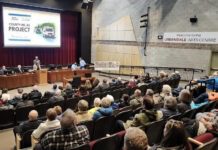Members of two local organizations – the Coalition Against the Proposed Prison (CAPP) and the Jail Opposition Group – have finally had their day in court, or possibly the first of many. Group members Victor Lachance (from CAPP) and Kirk Albert (from Jail Opposition Group) filed a judicial review application in August of 2022, hoping that a judge will grant a prohibition order to kill the construction of the Eastern Ontario Correctional Complex (EOCC), otherwise known as the “Kemptville Prison” or the “Kemptville Jail”.
On March 21, virtual court was in session to finally address the matter. The proceedings were not intended to address the merits of the EOCC project, but rather to decide whether the province’s motion to dismiss the judicial review application is justified.
Dozens of people were logged into the virtual courtroom at the scheduled hearing time of 10am on March 21. Decorum for those logged in to virtual court is expected to be the same as it would be for anyone attending a courtroom in person. Due to other matters before the court, it only took a few minutes for the Judge to postpone the proceedings for the Kemptville Jail matter until 2pm.
CAPP and the Jail Opposition Group hired high-profile Ottawa lawyer Stéphane Émard-Chabot to plead their case. Stéphane is a former Ottawa City Councillor, and a long-serving Assistant Dean of the University of Ottawa Law School. He spoke at length during the court proceedings, and his arguments before the court were largely based on his assertion that his clients are ordinary citizens who have gone to great lengths for some simple transparency. A lawyer for the province questioned why it took CAPP and the Jail Opposition Group so long to file a complaint, while the defense position argued that this was because the province was not releasing complete documents for public review.
Jail Opposition Group member and judicial review co-applicant Kirk Albert adds: “We’ve maintained that the province erred in their selection of the Kemptville site, but rather than test their platitudes before the Court as part of the Judicial Review, they are focusing all their effort into avoiding that process altogether. The province erred in the most serious of ways a government can in a democracy governed by the rule of law, they failed to follow their own laws. Specifically, legislated planning laws, by-passed to pave over increasingly scarce arable farmland, disregarding environmental features like floodplains and a creek with flow to the Rideau River, and all without the interest or ability to explain to the community how they made their decision. By anyone’s standard, it is perplexing, irresponsible and non-sensical. Tomorrow, we’ll be asking a judge to step in and reject the province’s motion to dismiss our judicial review application. The legality of the province’s decision deserves its day in Court, and the priority the Province has placed on attempting to sidestep it is telling in and of itself.”
Victor Lachance, a member of CAPP, and a judicial review co-applicant, explains the broader implications of the province’s actions concerning the EOCC, noting: “The motion to dismiss our judicial review application is just the latest in a series of moves by the Ford government to advance their plans to pave over farmland with highways, new suburbs, and costly, ill-advised infrastructure projects like prisons, without public consultation to line the pockets of their buddies in the construction and banking industries, who stand to make a fortune from robbing us of the resources required for a sustainable future. The province must be worried that if our judicial review to stop the EOCC from being built on farmland is successful, we will set a precedent that could be used to stop other backward-looking, 20th century-style infrastructure projects they want to steamroll forward like Highway 413 and greenbelt housing developments. In these cases, like the Kemptville Prison, the province has also ignored its own laws and failed to meaningfully consult with impacted residents, and so they’re looking for a precedent setting, get out of jail free card for the self-imposed mess they’ve created. It’s our position that the courts should not oblige”.
After the arguments from both sides were presented, the Judge promised to return with a decision “as soon as possible”, though this could mean days or even weeks. Readers are encouraged to check the Times website for updates in case a decision was made between our printing deadline, and the delivery of the paper.






